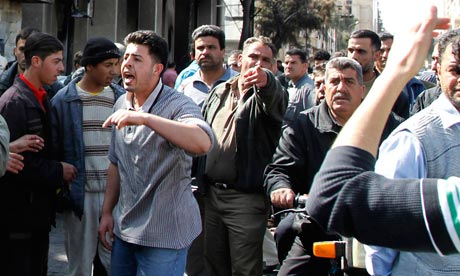- The Guardian,
- Article history

Hundreds of protesters gather in the southern Syrian city of Deraa. Photograph: Khaled Al-Hariri/Reuters
Syria faces the most serious unrest in the 11-year rule of President Bashar al-Assad as protests continue across the south.
Several hundred demonstrators reportedly took to the streets in the governorate of Deraa in the fifth consecutive day of clashes.
Last night there were reports that Syrian security forces killed four people on an attack on the Omari mosque in Deraa. Protesters calling for political freedoms and an end to corruption had said earlier that they were going to remain in the mosque until their demands were met.
Unrest has spread to the nearby towns of Inkhil, Jasim and Nawa, and rural areas around Damascus, witnesses said. The protesters have stopped short of calling for the overthrow of Assad. "The protests started in small numbers and with local grievances but have expanded as people have been killed," said an activist in Damascus, who asked for anonymity. "The use of force has made people angrier and encouraged large groups to turn out for the funerals."
On Friday, the security forces shot dead four people in Deraa, and on Sunday they fired teargas and live ammunition; one demonstrator was killed and scores were injured. An 11-year-old boy also died in hospital after inhaling teargas, according to local human rights monitors.
Security forces have reportedly softened their tactics, letting protests in smaller towns to proceed, but have stepped up arrests. The Syrian Observatory for Human Rights said scores of those party to the protests had been detained."Many bloggers, rights campaigners and journalists have been locked up," said the activist in Damascus. The US, UN and rights groups have condemned Syria's reaction to the largely peaceful protests.
In Deraa buildings have been set on fire and vandalised, and the city has been cordoned off by troops. Identity cards are being checked and phone and internet connections have been interrupted.
In addition to cracking down, The government has responded by organising pro-Assad rallies.
distributing propaganda. It has blamed the unrest on saboteurs, from Israeli agents to Palestinian extremists, and has claimed infiltrators dressed up as high-ranking officials are giving permission to forces to shoot. It has also made concessions. Faisal Kalthoum, governor of Deraa, has been dismissed. Sources told the Guardian that Deraa's head of political security has also been transferred.
Unrest broke out in several cities across the country on Friday but has since concentrated in Deraa and the suroundingsed in Deraa and the surrounding countryside, which suffers from high levels of poverty.
The surrounding tribal areas were upset by the detention of 15 children for political graffiti; their leaders have demanded the release of political prisoners in Deraa, an end to corruption, and the right to buy and sell property without permission, forbidden under emergency law currently forbidden under emergency law.
If these demands are not met, analysts predict, the protests could escalate. "People's demands are growing. If numbers rise, we are concerned about the use of violence to quash them," said Mohammed al-Abdullah, a Syrian human rights activist exiled in the US.
Syria has been under emergency law since 1963. Its extensive security forces are known for keeping a tight grip on the country and reacting with force. In March 2004, at least 36 people, mainly Kurds, were killed during unrest in the north-east.
• Katherine Marsh is a pseudonym for a journalist who lives in Damascus











